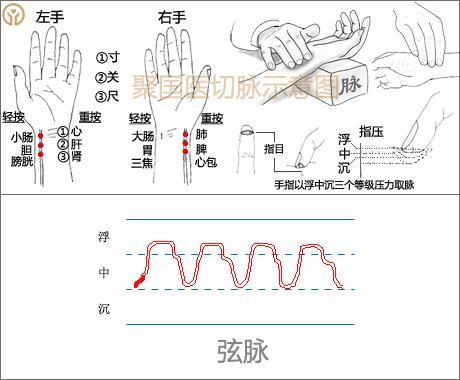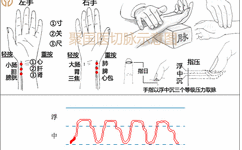What does the slippery pulse mean and how to regulate it? Friends who want to know can take a look. The editor shares useful articles every day, and there are more articles on the homepage. Your suggestions and corrections are welcome.
In Traditional Chinese Medicine (TCM), there are many types of pulse patterns. The slippery pulse, known as “xian mai” (弦脉) in TCM, is a type of pulse that feels like a taut string when pressed, straight and long, with a firm and buoyant quality. The slippery pulse indicates that the pulse felt by the fingers resembles a string that is pulled tight at both ends, like a taut string being plucked, and it has a definite strength and urgency.

Modern medicine believes that the slippery pulse is a result of various factors acting on the arterial blood vessels, leading to increased smooth muscle relaxation in the vessel walls; or it may indicate atherosclerosis in the radial artery, resulting in a pulse that appears straight and strong.
The slippery pulse can be classified into physiological and pathological types. Physiologically, it often indicates that the person is more patient and has a larger personality. Additionally, it is important to note that in spring, the pulse of normal individuals is often slippery. Pathologically, it may indicate that the patient has pain, liver disease, phlegm-dampness, or malaria.
So how can we regulate the slippery pulse? The following herbal formulas can help change the slippery pulse.
1. Long Dan Cao Xie Gan Tang (Gentian Decoction to Drain the Liver)
【Ingredients】: Long Dan Cao (Gentian Root, wine-fried) 6g, Huang Qin (Scutellaria, fried) 9g, Zhi Zi (Gardenia, wine-fried) 9g, Ze Xie (Alisma) 12g, Mu Tong (Akebia) 9g, Che Qian Zi (Plantago Seed) 9g, Dang Gui (Angelica, wine-washed) 3g, Sheng Di Huang (Rehmannia, wine-fried) 9g, Chai Hu (Bupleurum) 6g, Sheng Gan Cao (Raw Licorice) 6g.
【Usage】: Decoct in water and take orally.
【Function】: Drains excess fire from the liver and gallbladder, clears dryness and cold from the lower jiao.
【Indications】: Excess fire disturbing the liver and gallbladder, symptoms include headache, red eyes, hypochondriac pain, bitter mouth, deafness, ear swelling; or dryness and cold descending, symptoms include swelling and itching in the genital area, muscle atrophy, night sweats, turbid urination, and women’s damp-cold leucorrhea. Emotional changes (irritability, anger, mania, depression), jaundice.
【Note from TCM Expert】: When using this formula, Mu Tong should be omitted, especially Guan Mu Tong, as it has certain nephrotoxic effects; it can be replaced with Tong Cao (Rice Paper Plant). The herbs in this formula do not need to be fully included and should be adjusted according to the specific condition. This formula also has commercial preparations available.
2. Xiao Chai Hu Tang (Minor Bupleurum Decoction)
【Ingredients】: Chai Hu (Bupleurum) 24g; Huang Qin (Scutellaria) 9g; Ren Shen (Ginseng) 9g; Gan Cao (Licorice, roasted) 6g; Ban Xia (Pinellia) 9g; Sheng Jiang (Fresh Ginger) 9g; Da Zao (Jujube) 4 pieces.
【Usage】: Decoct in water and take orally.
【Indications】: Shaoyang syndrome. Pathogen is in the half exterior and half interior, symptoms include alternating chills and fever, fullness in the chest and hypochondria, lack of desire to eat or drink, irritability, nausea, bitter mouth, dry throat, dizziness, thin white tongue coating, and a slippery pulse; also applicable for women with typhoid fever, heat entering the blood chamber. Menstrual irregularities, intermittent chills and fever; or malaria, jaundice, and other miscellaneous diseases presenting with Shaoyang syndrome.
【Adjustments】: If there is nausea, add Sheng Jiang and Chen Pi; if there is irritability without nausea, omit Ban Xia and Ren Shen, add Guo Lou; if thirsty, omit Ban Xia and add Hua Fen; if not thirsty, with slight heat, omit Ren Shen and add Gui Zhi to induce slight sweating; if coughing, omit Ren Shen, Da Zao, and Sheng Jiang, add Wu Wei Zi and Gan Jiang; if there is irritability, add Zhu Ye and Jing Mi; if teeth are dry with no fluids, add Shi Gao; if there is excessive phlegm, add Guo Lou and Bei Mu; if there is abdominal pain, omit Huang Qin and add Shao Yao; if there is hardness under the hypochondrium, omit Da Zao and add Mu Li; if there is pain under the heart, add Qing Pi and Shao Yao; if there is palpitations and difficulty urinating, omit Huang Qin and add Fu Ling; if there is headache, add Chuan Xiong; if there is jaundice, add Yin Chen.
In addition to the slippery pulse, there are also terms like slippery pulse and deep pulse, but pulse diagnosis should be performed by a qualified physician to avoid misdiagnosis.
▶ Click here for new discoveries! ◀
Learn about health knowledge, and live better. Your likes and shares are welcome. This concludes the article on What does the slippery pulse mean and how to regulate it?

